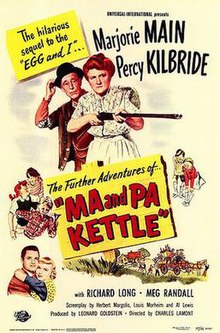Ma and Pa Kettle (film)
| Ma and Pa Kettle | |
|---|---|

Theatrical release poster
|
|
| Directed by | Charles Lamont |
| Produced by | Leonard Goldstein |
| Written by | Al Lewis |
| Based on |
The Egg and I by Betty MacDonald |
| Starring |
Marjorie Main Percy Kilbride |
| Music by | Milton Schwarzwald |
| Cinematography | Maury Gertsman |
| Edited by | Russell Schoengarth |
|
Production
company |
Universal Pictures
|
| Distributed by | Universal Pictures |
|
Release date
|
|
|
Running time
|
75 minutes |
| Country | United States |
| Language | English |
| Budget | $200,000 |
| Box office | $2,850,000 (rentals) |
Ma and Pa Kettle is a 1949 American comedy film directed by Charles Lamont. It is the sequel to the 1947 film version of Betty MacDonald's semi-fictional memoir The Egg and I and the first official installment of Universal-International's Ma and Pa Kettle franchise starring Marjorie Main and Percy Kilbride.
Ma and Pa Kettle have lived in a broken-down ramshackle farmhouse for twenty-five years in rural Cape Flattery, Washington. The Kettles' arch-nemesis, Birdie Hicks, organizes a town council meeting to condemn the Kettles' "garbage dump" farm. In order to receive a new tobacco pouch for entering a contest, Pa Kettle writes a slogan for the King Henry Tobacco Company.
During the council meeting to condemn the property, Alvin, the town's mailman, calls about a telegram declaring Pa Kettle the winner of the contest's grand prize of a new "house-of-the-future". Mayor Dwiggins is delighted and cancels the meeting in order to deliver the telegram personally to Pa. All of the council members arrive at Ma and Pa's farmhouse but are greeted by the 14 youngest Kettle children who thinking they are defending their home from condemnation, attack them with slingshots and toy guns.
The Kettles' oldest son Tom, on his way home after graduating from college, meets easterner Kim Parker on the train and shows her his plans to improve a chicken incubator to make it more affordable for farmers. Kim is a young writer full of theories on the advantages of modern living, but when Tom learns of his family's windfall, he objects to the characterization that his upbringing had been one of "abject" poverty.
The family move into their large house-of-the-future. After Pa suffers a sunburned face from a heat lamp while shaving, he alone moves back to their old house to further avoid such troublesome gadgets. The jealous Birdie Hicks accuses Pa of plagiarizing his prize-winning slogan from traveling salesman Billy Reed, who has a similar one on a calendar. The bad publicity threatens Tom's chances for financing his incubator.
...
Wikipedia
